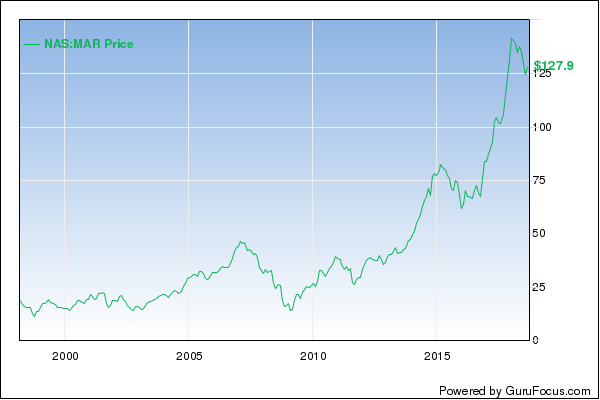Why Marriott's Strategy Could Boost Its Stock Price
- By Robert Stephens, CFA
Marriott (MAR)'s dominance of the global hospitality industry is showing little sign of slowing. The company's refreshed strategy, which includes a large pipeline of rooms and an upgraded loyalty program, could catalyze its financial performance.
A greater focus on innovation could help to maintain stock price growth. A move into the lucrative cruise sector and a deal with Chinese ecommerce company Alibaba (BABA) could provide it with a competitive advantage over peers. Its investment in encouraging direct bookings from customers may protect it from the rising competition of third-party travel sites.
Warning! GuruFocus has detected 2 Warning Sign with MAR. Click here to check it out.
The intrinsic value of MAR
Although the outlook for the global economy may be uncertain, GDP growth prospects remain robust. Further outperformance for the stock could be ahead after a 23% price rise versus a 16% gain for the S&P 500 in the last year.
Sound strategy
Marriott's share price could be boosted by its decision to combine its three loyalty programs. This will create a single loyalty program with over 110 million members. The combination will make it easier for members of the three programs to redeem points, achieve elite status and book stays across the company's 29 hotel brands. On average, members are expected to earn 20% more in points per dollar spent after the merger of the three loyalty programs. Revenue per available room is expected to increase following the decision, with greater choice for customers across a variety of price points set to lead to higher booking conversions.
The company's pipeline of rooms in development stood at 466,000 at the end of the last quarter. This is 25,000 higher than at the same time of the previous fiscal year. In the brand tiers in which the company operates, it is responsible for 30% of all hotel rooms under construction in the global industry. It is therefore increasing its domination of the segments in which it operates, as well as delivering revenue expansion. Its focus on matching increased capacity to latent demand means that revenue per available room increased by 3.8% in the second quarter of the year. Continued increase in its scale may therefore not cause reduced efficiency over the long run.
Innovation
Marriott is seeking to develop a greater competitive advantage versus its industry peers. For instance, investment in its booking channels means that customers can book rooms directly via the company's website, apps, call centers or at the property itself. Investment is being targeted in these areas to avoid a reliance on online travel agencies. Two-thirds of its transient business in 2017 was booked directly. It is matching rates on third-party sites, as long as customers book through its loyalty program.
The company is seeking to expand its operations through ocean voyages in its Ritz-Carlton Yacht Collection. The three yachts in the program are expected to set sail in 2020 and are due to provide a higher-end offering than most luxury cruises. With the company focused on the operation and licensing of the project, the venture will be capital-light. This will help to maintain a high return on invested capital for the business.
A deal with e-commerce company Alibaba could boost Marriott's performance in the Asian market. The offering of credit-based service Post Post Pay (PPP) provides customers with a wallet-free experience that includes express checkout and the automatic settling of room charges. With Alibaba having 500 million users across China, the partnership could strengthen the company's competitive advantage. The inclusion of 1,000 hotels globally in its Li Yu program may also boost sales in China, with the hospitality service helping to make Chinese citizens feel more welcome as they travel internationally.
Possible threat
Marriott is currently enjoying a tailwind from the growing world economy. The prospect of further tariffs, though, could hurt its growth outlook. JPMorgan has estimated that if the U.S. raises tariffs on all imports by 10 percentage points, and this action is replicated by the EU and China, it could reduce global GDP growth by 1.4 percentage points over the next two years. Given that tariffs on a number of goods are increasing by 25 percentage points, the impact of a full-scale trade war could be significantly worse than that estimate.
Outlook
The IMF, though, predicts global annual GDP growth will remain at 3.9% per annum through 2018 and 2019. Given Marriott's increased presence in China, it could benefit from the expected increase in the population of the country's middle class of 850 million between 2009 and 2030. Its dominant position in the hospitality industry may mean it occupies a financially stronger position than its rivals. Its capital-light business model may also equate to less pressure on its balance sheet in a recessionary period than is the case for sector peers.
Verdict
A focus on innovation and the adoption of a refreshed strategy could improve Marriott's stock price performance. The company's combined loyalty program has the potential to boost its financial performance, while new ventures and a large pipeline of rooms could deliver an increased competitive advantage.
Investment in gaining direct bookings and a deal with Alibaba have the potential to generate high growth over the long run. Although the prospects for the global economy may be uncertain, the company's dominant position could provide it with the capacity to deliver further growth.
After outperforming the S&P 500 in the last year, the stock still appears to have investment appeal over a long-term timeframe.
This article first appeared on GuruFocus.
Warning! GuruFocus has detected 2 Warning Sign with MAR. Click here to check it out.
The intrinsic value of MAR

